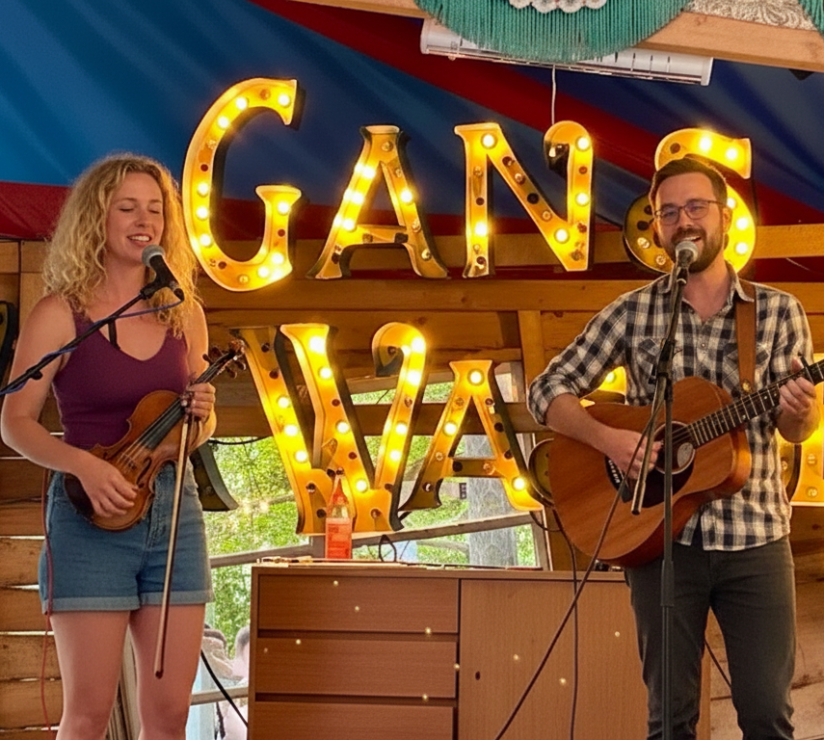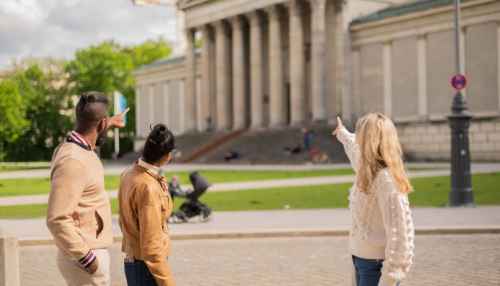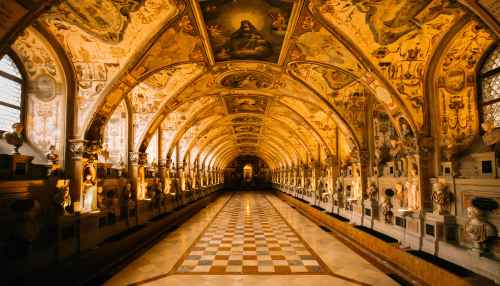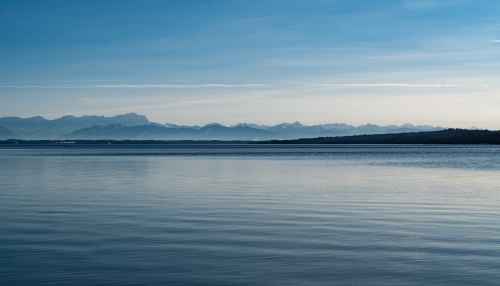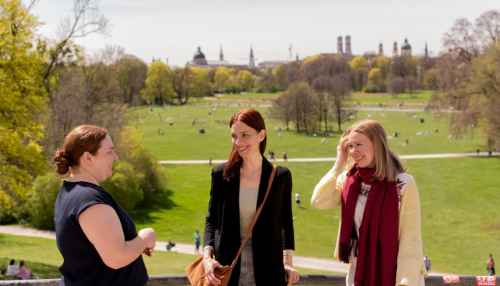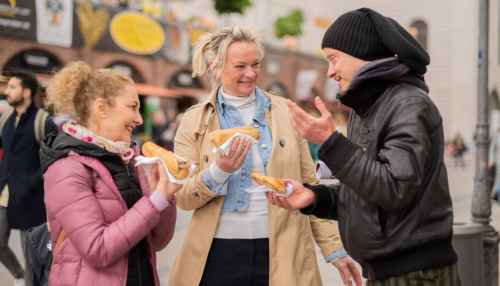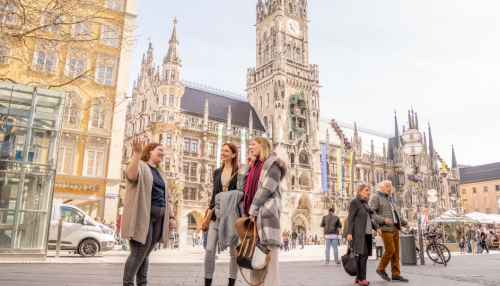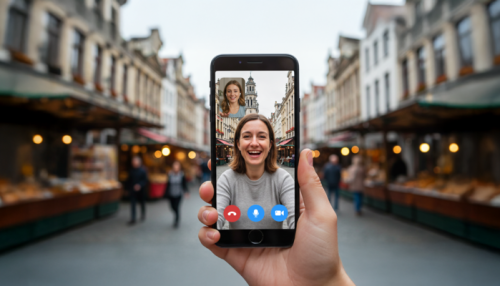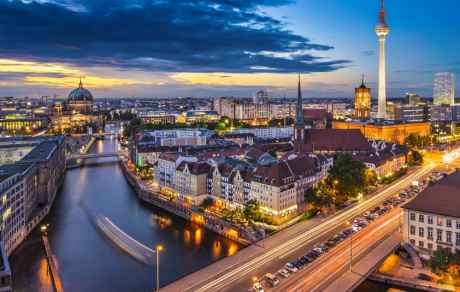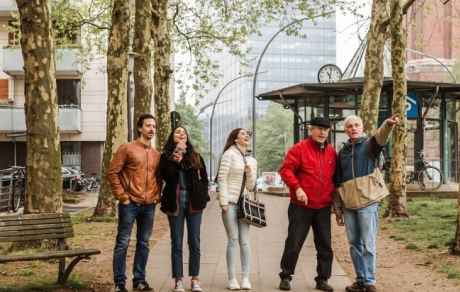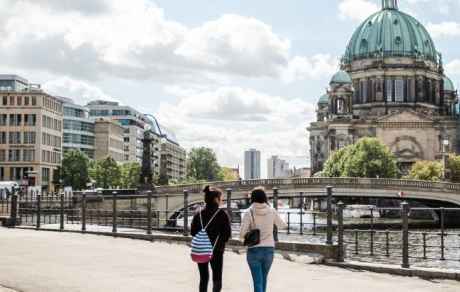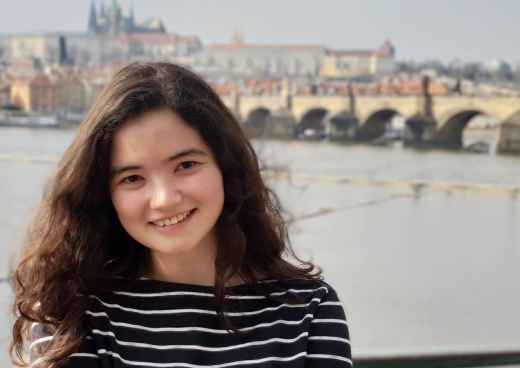Great morning seeing central Munich with Naveen. Perfectly timed Sunday. Shops are closed Sunday but we were able to experience the Munich Bells and in and out of beautiful churches. Plenty of history, current events, and restaurant recommendations.Robert, Munich, 2025
Table Of Contents
- What You'll Find When You Visit Munich: A Local's Perspective
- You Haven’t Really Done Munich Without These Authentic Experiences
- Must-Sees with Local Angles: A Different View of Iconic Munich
- Overrated with Keep, Tweak, and Alternatives
- The Food That Defines Munich: Where to Eat Like a Local
- Signature Leisure and Culture: Uncover Munich’s Hidden Art and History
- Neighborhood Explorations: Discover Munich’s Authentic Districts
- Things to Do in Munich Based on Interest: Tailor Your Day to Your Passions
- Practical Tips to Navigate Munich Like You Belong
- Seasonal Considerations When Munich Shines
- Frequently Asked Questions About Things To Do in Munich
- Why Munich Will Steal Your Heart
Before we get into the details, let me set the tone. I want you to read this like a friend showing you around rather than a brochure.
Munich's tourism board has done its job too well. You are probably here thinking about lederhosen, beer halls, and that famous Glockenspiel that draws crowds like moths to a flame. But here is what 33 years of living here teaches you. The real city exists in the spaces between standard tourist attractions.
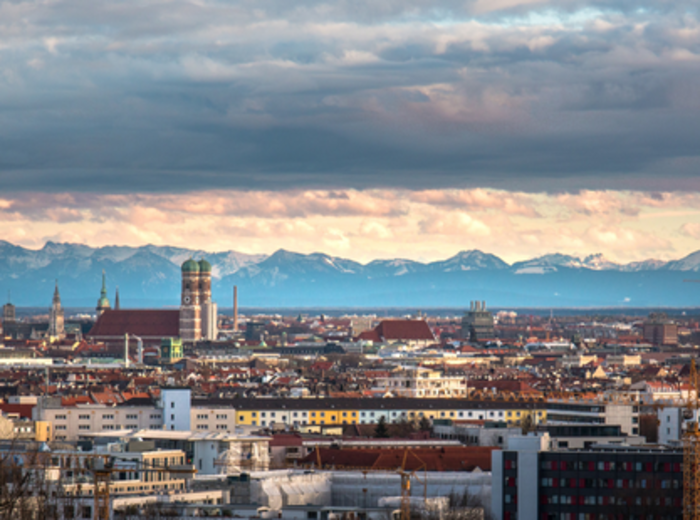
Beautiful city view of Munich with the Alps in the distance
I grew up here. I roll my eyes at the Glockenspiel shuffle every time I walk through Marienplatz. I still find corners that surprise me. This is not another checklist of things to do in Munich, where I tell you to snap selfies at Marienplatz. I am sharing the Munich I actually know. The places where Munich locals live, eat, and drink. If you want the good stuff without the circus, start with these Munich experiences.
What You'll Find When You Visit Munich: A Local's Perspective
This is Munich through clear eyes and dry wit. I'll show you where we escape the circus, which beer gardens are worth your time (spoiler: not the ones with tour buses), and why famous Munich tourist attractions are better admired from a distance, preferably through the window of a moving S-Bahn.
Most Munich sightseeing guides focus on the New Town Hall, the Old Town Hall, the English Garden, and Neuschwanstein Castle day trips. The typical things to do in Munich list miss what makes this city special. When people ask what makes a good visit in Munich, I tell them it's not about hitting all the sights, it's understanding that we're not walking theme park exhibits.
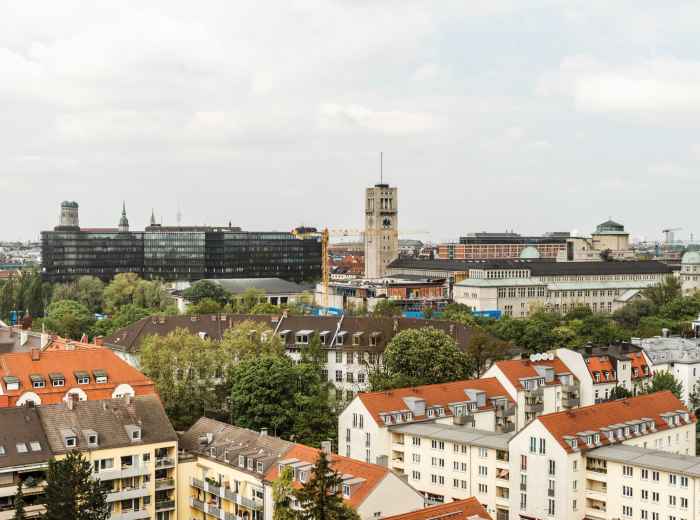
Traditional architecture mixed with Munich’s modern skyline
Standard things to do in Munich guides send you to the same overcrowded spots, but authentic experiences happen where locals actually spend their time, and where we don't need to elbow through selfie sticks to get a beer.
Ready to visit Munich without the clichés? Let's start with places that don't need megaphones to prove their worth.
Because No Two Travelers Are the Same
We help you shape a city day that matches your pace, your style, and your curiosity, not a fixed route.
You Haven’t Really Done Munich Without These Authentic Experiences
Start with the rhythms that locals live by. These are the moments that turn a visit into real city time. You will eat well and breathe better when you follow them. They are easy wins, and they steer you away from tour bus habits. Consider this your shortcut to the best things to do in Munich without the noise.
Beer Gardens: Where Locals Truly Socialize
Munich's beer gardens function as outdoor living rooms where social hierarchies flatten and community appears naturally. Bring your own food and buy delicious beer. Share tables with strangers who might become friends. White tablecloths mean restaurant service with higher prices. Bare wooden tables mean self-service, and outside food is welcome. Large tables are communal unless reserved. Say Servus and claim your spot with good manners. This is the whole point.
River Culture: Relaxing Along the Isar
The Isar is our summer playground. After work, half of the city migrates to the river with grills and blankets. Best spots for people who want to blend in:
- Flaucher for wide meadows and space to breathe
- Maximiliansanlagen for central views and after-work energy
- Oberföhring for quieter stretches and actual peace

A beautiful day out by the Isar River, a favorite local hangout
Gärtnerplatz: Munich’s Living Room for the LGBTQ+ Community
Gärtnerplatz is Glockenbachviertel’s living room anchored by the Gärtnerplatztheater. Indie boutiques, natural wine, and a theater that anchors the square. This is the city’s LGBTQ+ heart, and acceptance reads as default rather than a campaign. Evening aperitifs slide into late conversations. You participate rather than observe. That is why locals come here. For Munich at night, the square hums with easy energy, aperitifs, conversations, and a crowd that actually lives here.
English Garden: Beyond the Crowds to Hidden Corners
The English Garden deserves its reputation as one of Europe’s largest urban parks. Most guides funnel everyone to the Chinese Tower. You do not need to.
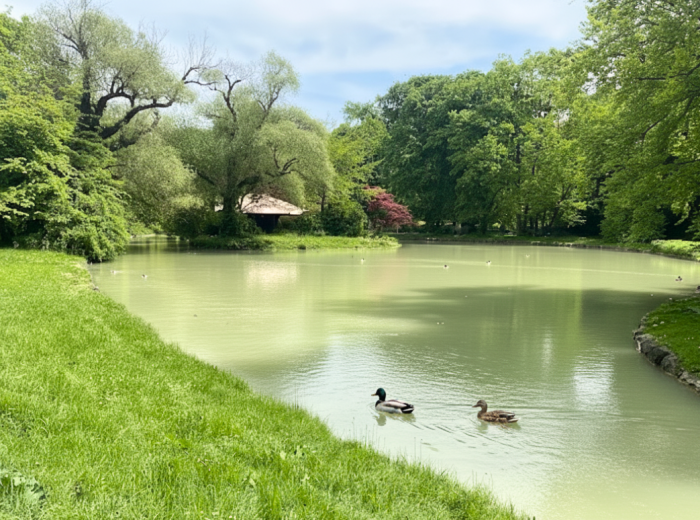
Hidden corner of the English Garden, far from the tourist crowds
Kleinhesseloher See for a family-friendly beer garden and lakeside calm. Monopteros for a small temple and a wide city view in a few steps. Northern meadows for yoga and sun without the circus. The Chinese Tower is historic, and the beer is fine. The crowds make it a performance. Many locals skip it.
Südfriedhof and Bogenhauser Friedhof: Munich's Peaceful Cemeteries
Yes, I'm sending you to cemeteries, something no guidebook recommends because dead people don't buy souvenirs. Südfriedhof is a leafy sanctuary where ivy covers centuries-old gravestones and art nouveau monuments create outdoor galleries. Bogenhauser Friedhof houses cultural icons like comedian Helmut Fischer, who'd probably appreciate the irony of being a tourist attraction.
Südfriedhof opened in 1563, becoming Munich's Pere Lachaise with elaborate tombs doubling as public art. This represents Munich sightseeing for people who want depth over Instagram moments, plus, the dead don't complain about selfie sticks. Munich's cemetery culture emphasizes beauty over morbidity. Families tend graves like gardens, creating contemplative spaces that are honestly more peaceful than most beer gardens in August.
Roseninsel: Bavaria’s Secret Retreat on Lake Starnberg
While tour groups queue for Neuschwanstein Castle like it's a Disney ride, Lake Starnberg hides a secret. A little island where King Ludwig II went to escape people, exactly like those tour groups. You'll take a small ferry, about €4–€5 round trip (May to October, prices/schedule subject to change), and when you arrive, it's just you, roses, and the Alps shimmering in the distance.

Approaching Roseninsel, a tranquil escape on Lake Starnberge
This royal palace retreat represents everything tourists seek at famous Munich tourist attractions without the crowds, mainly because most people can't be bothered to take a ferry. King Maximilian II created the villa known as the Casino around 1851–1853 and had the landscape laid out from 1853. Ludwig II later used it as a private retreat. Smart man. Today's villa houses a small museum, but the real draw is wandering through 2,000 rose bushes that peak in June.
No crowds, no souvenir stands, no one trying to sell you a plastic pretzel. It's just a short walk from the ferry to the gardens, one of the most relaxing things to do in Munich that doesn't require noise-canceling headphones.
Ostpark: Munich’s Best-Kept Secret for Relaxation
Skip the English Garden selfie parade, where every walking tour stops to photograph the Chinese Tower, originally built in 1789 and rebuilt after World War II. Details can change, check current info before you go. Ostpark feels like the countryside that snuck into the city when no one was looking, one of Munich's largest urban parks that tourists rarely discover because it's not on their must-photograph lists.
This Olympic Park-era creation from the 1970s serves traditional Bavarian food and Spaten beer by the lake. Unlike the English Garden's Chinese Tower area that draws every guidebook, Ostpark remains genuinely local because there's no ancient wooden tower to Instagram.
Sunday afternoons bring three-generation families for extended outings. Pure gemütlichkeit without anyone performing Bavarian stereotypes for tips.
Curious What You Won’t Find Online in Munich?
Discover the side only locals talk about.
Must-Sees with Local Angles: A Different View of Iconic Munich
You can do the icons without feeling like part of a parade. Use these angles, and you will keep your sanity. Most lists point you at New Town Hall, Old Town Hall, the English Garden, and a Neuschwanstein day trip. That is fine at a distance. You can do the icons with sanity if you use local angles.
St. Peter’s Church: A Local’s Favorite Spot for City Views
I take the stairs at a steady pace and stop on the narrow landings when the bells warm up. The tower has tight corners and worn steps that tell you how many feet came before yours. At the top, you get a clean sweep over Marienplatz, the New Town Hall, and the Old Town Hall. On clear days, you can trace the old town streets like a paper map. In winter, the wind can bite, so pack a hat and breathe through it. There is a small fee at the door, and it is worth every coin for a view that still shuts me up after thirty years.
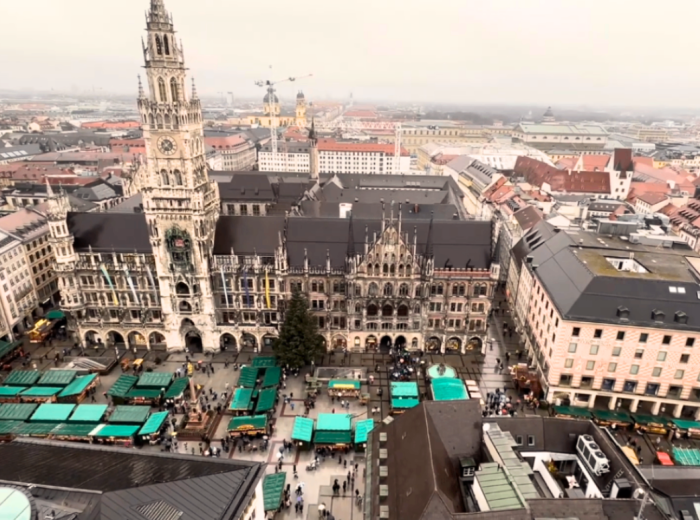
View from St. Peter’s Church tower, overlooking Marienplatz and Munich’s skyline
Bavarian National Museum: Regional Culture That Matters
The Bavarian National Museum tells Bavaria's story through decorative arts, religious artifacts, and folk traditions that explain the cultural context behind traditions tourists encounter in superficial forms. Unlike encyclopedic Munich tourist attractions that try to cover everything, this focuses on regional identity with scholarly depth.
The Christmas exhibition features nativity scenes from across Bavaria, seasonal displays that Munich locals visit annually because they reveal cultural traditions rather than just pretty objects.
Juristische Bibliothek: Munich's Gothic Hidden Gem
Inside New Town Hall hides Munich's most cinematic secret: a dark-wood, spiral-staircase law library that looks like Harry Potter's study hall had a gothic baby with a Bavarian library. Floor-to-ceiling bookshelves, wrought-iron stairs, and stained glass create functional architecture elevated to art.
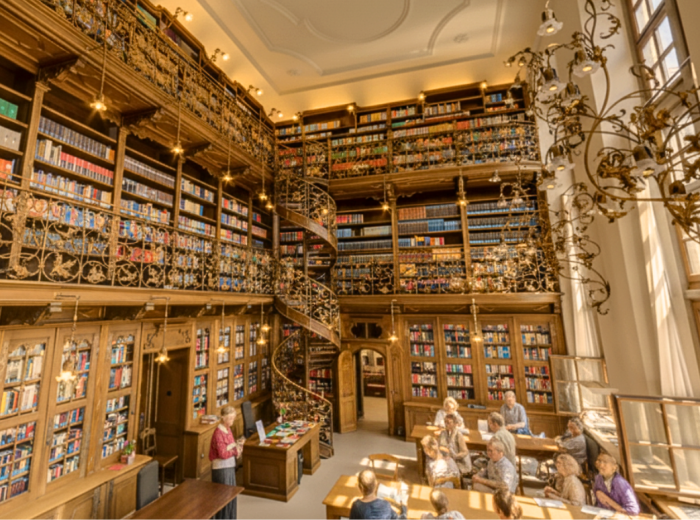
Interior of the Juristische Bibliothek, Munich’s hidden gothic gem
Access is via city-run guided visits of the New Town Hall or limited booking slots. This represents hidden layers within the obvious Munich tourist attractions. The New Town Hall draws crowds for its Glockenspiel performance, but the real treasure sits inside where tour groups don't think to look.
Old Town Hall: A Quick Glimpse of Munich’s Historic Core
I give the Old Town Hall a respectful minute on my loop through Marienplatz. The stepped gable photographs clean against a bright sky. Walk through the arch and feel how the square tightens and loosens again. If the light is flat, I keep moving to Petersbergl for texture and shade. Treat it as a quick historical touch and save your time for a view or a coffee. You will not miss anything by keeping it brief.

Facade of Old Town Hall, a quick glimpse into Munich’s historic core
Deutsches Museum: Science Beyond Tourist Attraction Superficiality
Pick a section and dive in. Hands-on science works best when you are not trying to conquer the whole complex in one go. The Deutsches Museum ranks among the world's largest science museums, but Munich locals visit repeatedly, focusing on specific sections rather than attempting the impossible task of seeing everything in one overwhelmed visit. This represents substantive things to do in Munich for people seeking depth over surface-level tourism and photo opportunities.
Unlike passive things to do in Munich, experiences that treat you like a consumer, hands-on demonstrations make complex technology accessible through direct manipulation and actual learning.
Nymphenburg Palace: The Royal Escape Right in the City
Nymphenburg Palace is Munich’s baroque summer residence with vast parkland, canal views, and pavilions that feel a world away from the city. Start at the main palace, then walk the gardens to Amalienburg and the small lakes where herons ignore visitors. Trams and buses make it simple to reach, and you can combine the palace with a quiet hour in the nearby Neuhausen cafés. Go early for calm light and space to breathe.
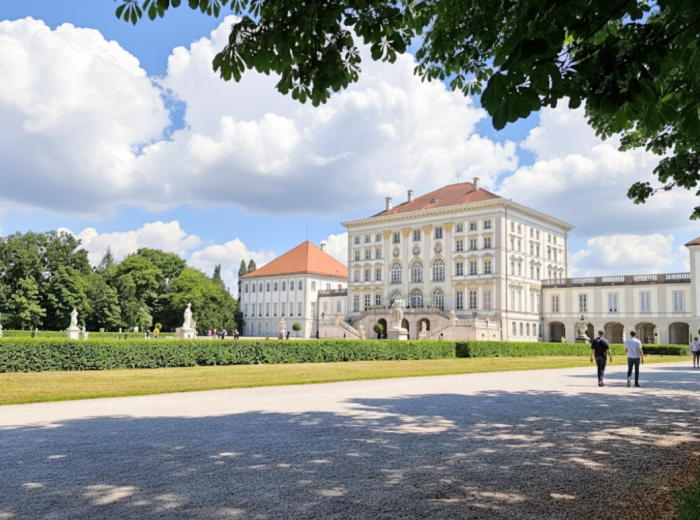
Exterior view of Nymphenburg Palace, showcasing its royal architecture
BMW Museum: Automotive Culture Beyond Corporate Marketing
Design. Engineering. History that shaped transport. The BMW Museum and BMW Welt sit together. Treat them as one cluster. They represent Munich's automotive heritage beyond brand marketing and corporate promotion. Historical development, design evolution, and engineering innovations that shaped modern transportation, for people who appreciate how things actually work.
Munich locals appreciate BMW as a significant employer and technology innovator rather than a tourist curiosity or a luxury brand status symbol.
Munich’s real charm hides in the places that don’t shout ‘authentic Bavarian experience’ in four languages.
Overrated with Keep, Tweak, and Alternatives
Every city has them, and I'm not going to pretend Munich doesn't. Here's my honest take on overhyped spots that dominate things to do in Munich lists, plus better alternatives that won't make you question your life choices.
Most generic things to do in Munich recommendations miss the places where locals enjoy themselves, mainly because we've learned to avoid anywhere that advertises "authentic Bavarian experience" in four languages.
Hofbräuhaus: Skip the Tourist Show for Authentic Beer Gardens
The reality: Munich's most famous beer hall is loud, overpriced, and packed with stag parties wearing plastic lederhosen they bought at the airport. Yes, it's historically significant, but so is the Black Death, it doesn't mean you want to experience it.
You'll see tour groups taking photos of their beer before drinking it, inflated prices that would make a theme park blush, and waitstaff performing "Bavarian hospitality" like community theater actors. The Munich beer is decent, but you're paying for the name rather than anything resembling authentic beer culture.
Augustiner Keller represents everything Hofbräuhaus used to be before it discovered international tourism revenue. Ancient chestnut trees, communal wooden tables, and delicious beer served from wooden barrels, where actual Munich locals still drink without performing for cameras. This beats any commercial brewery tour. You're experiencing authentic German beer culture where families actually gather rather than pose.
Neuschwanstein Castle: Why You Should Skip the Crowds
Neuschwanstein Castle attracts about 1.4 million visitors annually, which sounds impressive until you realize that's roughly the population of Munich trying to visit the same building. What actually happens: Two-hour bus rides each way through Bavarian countryside you can't enjoy because you're stressed about timed entry tickets, then 30 minutes inside covering 14 rooms while someone rushes you along.

Neuschwanstein Castle, a fairytale landmark in the Bavarian Alps
The smarter choice is Schloss Schleißheim, about 30–45 minutes from the center, including a short walk or bus from Oberschleißheim station. This baroque palace complex offers comparable royal palace grandeur without the crowd management system that makes visiting feel like airport security. For effortless Munich day trips, Schloss Schleißheim delivers palace glamour without the queues or timed tickets.
Multiple palaces, stunning baroque gardens, and you can actually walk right in without planning your visit like a military operation. The S-Bahn journey costs a fraction of Neuschwanstein Castle tours and doesn't involve fighting for bus seats.
Avoid the Hop-On, Hop-Off Buses: Explore Munich on Foot
These buses promise convenient Munich sightseeing but deliver views of Munich's least photogenic features, like construction sites, delivery trucks, and the back sides of buildings. Munich's city center is compact and walkable. Most major Munich tourist attractions sit within 15 minutes of each other, assuming you can walk faster than traffic moves.
Walking tours led by Munich locals who actually know where they're going, or simply walking using excellent public transport for longer distances. Skip the generic brewery tour buses. You'll discover more about beer culture by visiting actual beer gardens where locals drink rather than listening to canned commentary through headphones.
Nymphenburg Palace: Discover the Real Royal History Without the Crowds
Instead of Neuschwanstein Castle crowds, locals prefer Nymphenburg Palace, a baroque summer palace complex within Munich city limits that doesn't require a day-long expedition. This summer residence offers extensive gardens, multiple museums, and an authentic royal palace experience without the day-trip logistics that make you question why you left your hotel.

Nymphenburg Palace interior
Nymphenburg advantages: Accessible by public transport, extensive parklands where locals actually picnic, multiple museums, and space to explore without feeling like cattle being herded through turnstiles. Ready for deeper cuts and small wonders. Check hidden gems in Munich.
Olympic Park: Use It for Outdoor Fun, Not Tours
Olympic Park deserves its reputation as one of Munich's largest urban parks, created for the 1972 Olympics. The Olympic Stadium, with its tent-like roof, remains architecturally significant, but Olympic Tower offers city views. Locals know that better alternatives for any rooftop terrace in the city center provide similar perspectives without admission fees. Skip the touristy rooftop terrace experiences and find neighborhood spots with better atmosphere and fewer crowds taking the same sunset photos.
Use Olympic Park for outdoor recreation and concerts rather than paying for Olympic Stadium tours that mostly show you empty sports facilities where nothing interesting is happening.
What If Your Next City Day Didn’t Come From a Guidebook?
Instead of following a script, we connect you with someone who lives there and knows the places worth your time
The Food That Defines Munich: Where to Eat Like a Local
This is where tradition meets daily life on a plate. You will find traditional Bavarian food in beer gardens and beer halls that locals actually use. Think roasted pork knuckle with crackling, weisswurst before noon, and Munich beer that tastes clean and fresh. Add Viktualienmarkt for fresh produce and simple snacks, then follow your nose to the next place with delicious food and real beer culture. If you’re wondering what to eat in Munich, start with roast pork, weisswurst before noon, and a Maß of clean, fresh lager.
Beyond the Checklist
Discover the city guidebooks don’t cover with a local by your side.
Augustiner Bräustuben: The Gold Standard of Munich’s Beer Culture
Augustiner Bräustuben represents everything authentic about Munich's beer culture, and everything Hofbräuhaus used to be before international tourism revenue became more important than local customers. Classic communal tables, fresh-from-brewery Munich beer, duck, and goulash that taste exactly the same as they did when my grandfather ate here.
What makes it essential? This functioning beer hall hosts actual Munich families celebrating actual birthdays, business associates closing actual deals, and friends gathering for the kind of long, lazy dinners that define Bavarian social culture rather than Instagram content.

Locals enjoying traditional Bavarian food and beer at Augustiner Bräustuben
Traditional Bavarian food is executed perfectly without the theatrical presentation. Schweinebraten with crackling skin that actually crackles, sauerbraten representing comfort food elevated to art. Roasted pork knuckle gets proper preparation, skin crackling like a fireplace, meat falling off the bone like it's supposed to, not like it's been sitting under heat lamps waiting for photo opportunities.
Gasthaus Weinbauer: Schwabing’s Hidden Gem for Traditional Bavarian Food
Tucked in a quiet Schwabing corner, Gasthaus Weinbauer maintains the antler-and-schnapps tradition from back when such things were lifestyle choices rather than tourist attractions. Genuine hospitality without performance. Imagine that.
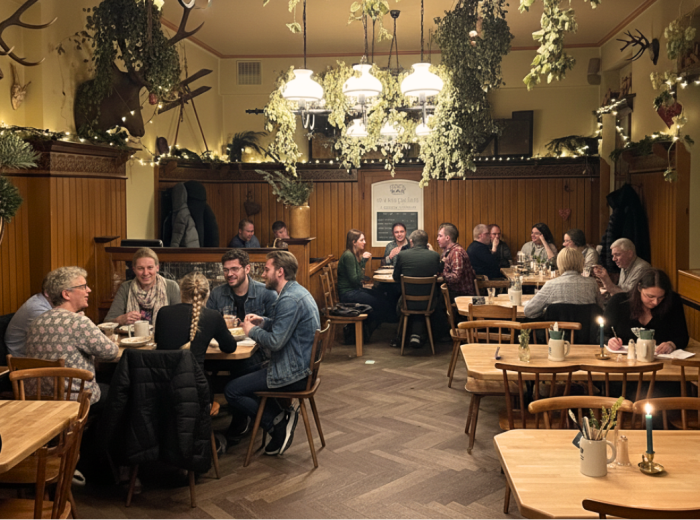
Interior of Gasthaus Weinbauer, where traditional Bavarian food is served in a cozy atmosphere
Seasonal game showcases Bavaria's actual hunting traditions, while fish preparations reveal the kind of technical skills that develop when you're cooking for locals who'll complain if it's not perfect. Traditional Bavarian food in an atmosphere that feels like eating in someone's traditional living room, if that someone happened to have excellent taste in wine and interior design.
Tattenbach: Student-Approved Bavarian Food Without the Pretense
Easy-going Lehel's favorite attracts students seeking traditional Bavarian food without pretension or the kind of prices that suggest the schnitzel was personally blessed by a Michelin inspector. Giant schnitzels, down-to-earth atmosphere, honest cooking that tastes like someone's grandmother made it, if your grandmother happened to be an excellent cook rather than just claiming to be.

Generous portions of schnitzel served in a casual, authentic Bavarian setting at Tattenbach
Generous portions, fair prices, and authentic preparation that doesn't need to prove itself. Schnitzel arrives golden, crispy, and hanging off the plate edges because that's how schnitzel should be served, not because it looks good on social media. Roasted pork knuckle gets traditional treatment when available, which is when they feel like making it, not when the tour bus schedule demands it.
Gabelspiel: Modern Bavarian Innovation with a Michelin Nod
Giesing's Gabelspiel earned Michelin Bib Gourmand by respecting Bavarian ingredients while applying contemporary techniques, proving that tradition and innovation can coexist when you actually understand both. Creative weekly menus showcase fresh produce and local suppliers rather than whatever photographs well.
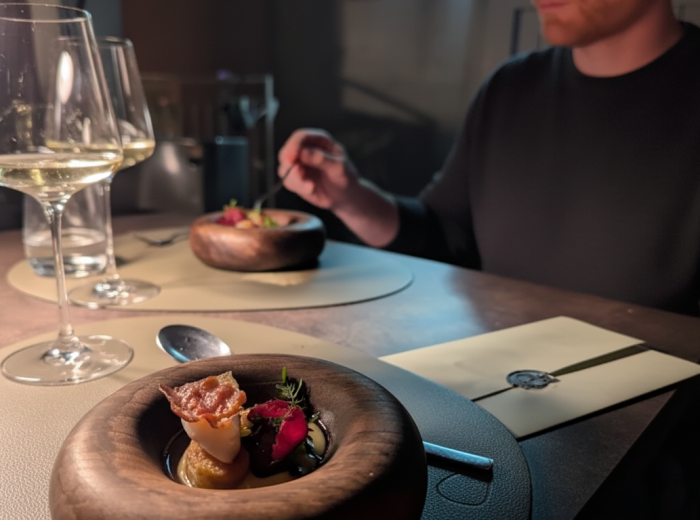
Modern Bavarian cuisine at Gabelspiel, where tradition meets innovation
Chef-driven cuisine honoring Bavaria's agricultural traditions with modern methods that enhance rather than obscure the ingredients. Book ahead. Michelin recognition increased demand significantly, though the food was always this good. Now more people know about it.
Understanding Beer Gardens: The Real Munich Beer Culture
Munich's beer gardens function as outdoor dining rooms where social rules encourage community rather than performance. Bring your own food, buy delicious beer, share tables with strangers who might become friends, or at least interesting conversation partners.

A sunny day in a Munich beer garden, where locals gather to enjoy beer and food
White tablecloths mean restaurant service with higher prices; wooden tables mean self-service, where bringing outside food is not just allowed but a traditional beer culture practice dating back centuries. Large tables are communal unless reserved, and yes, you'll share space with strangers, which is the entire point.
The Real Roasted Pork Knuckle Experience: Authentic Bavarian Flavor
Roasted pork knuckle exists beyond tourist restaurants, but authentic versions require proper preparation that distinguishes genuine traditional Bavarian food from tourist theater. The skin should crackle when you cut it, the meat should fall off the bone without requiring construction equipment, and the sides should balance richness with acidity rather than just filling space on the plate.
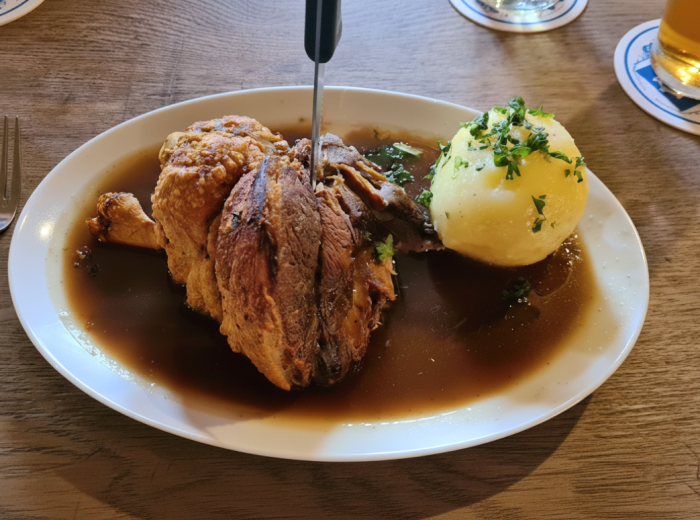
Roasted pork knuckle served with crispy skin and beer, an authentic Bavarian experience
Where Munich locals order roasted pork knuckle: Augustiner Keller, Löwenbräu Keller, neighborhood beer gardens that take pride in traditional preparation rather than portion size. Avoid places advertising it as their specialty; good kitchens consider it one item among many rather than their entire marketing strategy.
Munich Is More Than Its Checklists
Step into tucked-away places and everyday stories you won’t find on maps.
Signature Leisure and Culture: Uncover Munich’s Hidden Art and History
This is where Munich slows your pace and sharpens your focus. Wander the museum quarter for world-class museums that sit close together and actually reward a short visit done well. Mix contemporary art at Haus der Kunst with the crafted rooms of Villa Stuck, and you will feel the city’s range. Add a stop at the Oktoberfest Museum for beer culture with context, and finish at Pasinger Fabrik if you want small stages with a big heart. These are cool museums and venues that locals return to when they want ideas, not just photos.
Villa Stuck: Contemporary Art in an Art Nouveau Setting
Franz von Stuck's Bogenhausen mansion represents Munich's fin de siècle cultural flowering while functioning as a contemporary art museum that tourists rarely discover, mainly because it requires stepping outside the main tourist circuit and thinking independently.

Interior of Villa Stuck, showcasing its Art Nouveau design and contemporary art
Complete artistic vision preserved. Every surface displays artistic intention rather than committee-designed crowd-pleasing. Contemporary art exhibitions explore connections between past and present movements in ways that reward actual thinking rather than passive consumption.
Haus der Kunst: Munich’s Complex Relationship with Contemporary Art
Haus der Kunst represents Munich's complex 20th-century history while serving as a premier contemporary art venue. Built during the Nazi party period as a showcase for approved art, it now houses cutting-edge exhibitions that directly challenge the aesthetic principles it was originally designed to promote.

Haus der Kunst exterior at night
International contemporary art exhibitions position Munich within global cultural conversations rather than limiting the city to tourist stereotypes and historical clichés.
Pasinger Fabrik: Suburban Culture Hub with Artistic Heart
Former factory turned cultural center proves creativity thrives outside traditional districts and tourist expectations. Converted industrial space houses intimate opera, experimental theater, and rotating exhibitions that prioritize artistic merit over mass appeal.
The 99-seat opera venue creates intimacy between performers and audiences that you'll never experience in traditional opera houses designed to impress rather than engage. Community center serving local families alongside culture enthusiasts who understand that accessibility and quality aren't mutually exclusive.
Oktoberfest Museum: Beer Culture Beyond the Commercial Festival
The Oktoberfest Museum explores Munich's beer culture beyond the commercial beer festival that dominates international perceptions and tourist expectations.

Historic beer steins and exhibits inside Munich’s Oktoberfest Museum
Beer culture complexity, Oktoberfest local significance, and traditional celebrations that existed long before international tourism transformed the festival into the massive commercial enterprise it is today.
Weekend Cycling Culture: Active Exploration Beyond Munich’s Streets
Munich's flat terrain creates a cycling culture that transcends transportation to become recreation, socializing, and exploration rolled into one. Weekend cycling expeditions connect urban neighborhoods with the countryside, one of the most enjoyable things to do in Munich that tourists rarely discover because it requires slightly more effort than taking a bus.
Popular routes for people who understand that the journey matters: Isar Cycle Path, from the city center to Freising through riverside landscapes that change with the seasons. Lake Starnberg Loop, a 49-kilometer circuit that feels like a vacation from city life. Olympic Park to Schleißheim, Urban parks connected by cycling infrastructure that actually works.
These routes represent active things to do in Munich that locals actually enjoy rather than endure. Imagine that.
Christmas Markets: Community Celebrations Beyond Tourist Consumption
Munich's Christmas markets range from massive tourist magnets to neighborhood celebrations that maintain authentic community function, if you know where to look and when to avoid the crowds.
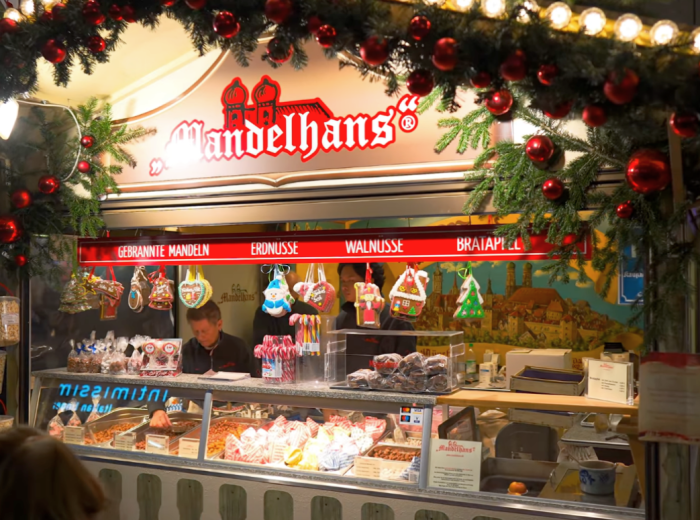
Neighborhood Christmas market stall in Munich with gingerbread hearts
Local Christmas markets that haven't been completely commercialized: Sendlinger Tor, Neighborhood scale, with vendors who actually live in Munich. Schwabing, the University district, is a character that attracts locals rather than bus tours. Haidhausen, village atmosphere with authentic medieval Christmas market charm that doesn't feel manufactured
What makes the Christmas markets special, you may wonder. It's the handmade decorations that aren't available on Amazon, delicious food for immediate consumption rather than photos, and artisanal crafts that have actual stories behind them. Weekday evenings offer better experiences than weekend crowds when everyone's trying to capture the same "authentic German Christmas" moment. Some smaller markets maintain a medieval Christmas market atmosphere through handcrafted goods and traditional settings rather than imported decorations and recorded music.
Skip the Script, Savor the Story
Explore Munich with a local who tailors your day to you, from secret beer gardens to untold city stories.Neighborhood Explorations: Discover Munich’s Authentic Districts
Munich makes sense when you walk its districts with purpose. Start in the old town for a quick read of the city center, then step into places where Munich locals actually live. Glockenbachviertel and Gärtnerplatz give you evenings that feel easy. Maxvorstadt brings the museum quarter and world-class museums within a short stroll. Haidhausen, Schwabing, Westend, Neuhausen, and Bogenhausen round out a mix of cafés, beer gardens, and calm streets that keep finding you new things to do in Munich. Think of this section as your shortcut to understanding Munich neighborhoods without the fluff.
Altstadt (Old Town): Where History Lives Alongside Daily Life
Munich's old town concentrates famous Munich tourist attractions, New Town Hall, the Old Town Hall, and St. Peter's Church, but locals somehow maintain daily routines despite the tourist infrastructure that threatens to overwhelm everything.

Early morning Marienplatz and New Town Hall
Early morning, Altstadt belongs to residents walking dogs, opening shops, and commuting to actual jobs. The atmosphere completely changes once walking tour groups arrive around 9 AM, transforming authentic neighborhood energy into a performance space.
Petersbergl: tiny streets behind St. Peter's tower with traditional shops serving neighbors. Sebastiansplatz: a small square where residents drink morning coffee while tourists photograph nearby attractions. Heiliggeistkirche: an active parish church where Sunday services continue despite surrounding commercialization.
Glockenbachviertel: Munich's LGBTQ+ Heart and Progressive Culture
One of Germany’s most prominent LGBTQ+ districts maintains progressive politics while attracting diverse residents who appreciate inclusive community culture rather than rainbow-washing marketing campaigns. Rainbow flags hang year-round because acceptance is the neighborhood policy, not seasonal decoration.
Independent bookstores, vintage shops, galleries, and cafés that encourage lingering conversations over quick consumption. Gärtnerplatz functions as an outdoor living room where evening socializing crosses generational and cultural lines naturally.
Maxvorstadt: Munich’s Intellectual Hub with World-Class Museums
Home to Ludwig Maximilian University (LMU) and the museum quarter, Maxvorstadt combines student energy with high culture in ways that reward intellectual curiosity. This district houses several world-class museums, including the Pinakothek collections that rival any European capital, plus the kind of café culture that prioritizes conversation over productivity.

Fountain at LMU in Maxvorstadt near the museum quarter
Student presence keeps rents relatively reasonable and creates a café culture that prioritizes conversation over laptop productivity. Pinakothek museums create artistic concentration that influences local businesses and social gatherings. Unlike other cities where you trek across town for culture, Maxvorstadt concentrates world-class museums within walking distance, creating cultural density that rewards extended exploration.
Haidhausen: A Village Atmosphere in the Heart of Munich
Former working-class district maintains village atmosphere through neighborhood institutions, local businesses, and residents who've lived here for generations, rather than viewing it as a lifestyle choice or investment opportunity.
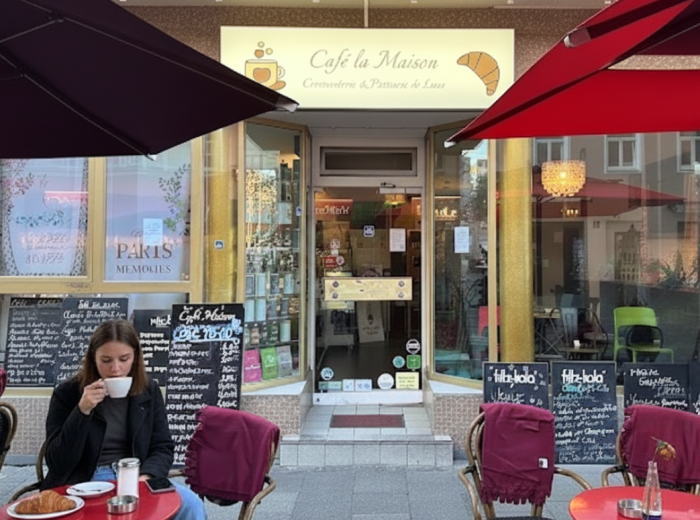
Traditional Haidhausen bakery in the morning
Traditional bakeries where locals collect daily bread and exchange neighborhood news, corner pubs serving as informal community centers, and small parks where children play while parents socialize without scheduling playdates through apps.
Schwabing: From Bohemia to Cultural Sophistication
Once home to Thomas Mann and Kandinsky, Schwabing retains cultural sophistication while becoming more expensive and polished. The inevitable result of success and recognition.
Art nouveau architecture houses galleries and creative businesses, independent cinemas screen art films and foreign movies that never reach multiplexes, and bookstores specialize in literature and philosophy rather than bestseller displays. Wine bars and literary readings provide fun evening entertainment that emphasizes cultural engagement over nightclub spectacle or tourist-oriented performance.
Westend: Munich's Multicultural Heartbeat
Munich's most diverse district reflects immigration history through Turkish bakeries, Balkan restaurants, and international grocery stores serving communities from across the globe. For a fun evening with authentic ethnic food and lively atmosphere, Westend offers experiences most tourists never discover because they're too busy seeking "authentic Bavarian" whatever.
Multiple immigrant communities create authentic ethnic restaurants and cultural centers that make Westend Munich's most internationally flavored district, the kind of diversity that develops organically rather than being designed for cultural tourism.
Sendling: Where Working-Class Heritage Meets Creative Future
Former working-class district attracts artists and young professionals seeking affordable housing and authentic neighborhood character that hasn't been gentrified beyond recognition, yet.

Weekend market in Sendling’s community square
Weekend flea market becomes neighborhood gathering where residents buy, sell, and socialize, community interaction taking precedence over commercial transactions or profit maximization.
Neuhausen: Calm Days Near Nymphenburg Palace
I come here when I want a calm day that still feels close to the city center. Streets are quiet enough for a slow walk and close enough to Nymphenburg for a quick palace and park loop. Rotkreuzplatz gives you everyday Munich with cafés and small markets that serve the neighborhood first. Taxisgarten sits nearby for a classic beer garden hour that does not feel staged. Families fill the benches, and nobody hurries you. It is an easy tram hop to the museum quarter when you want more.
Bogenhausen: Elegant Munich with Quiet Sophistication
Upscale residential district attracts affluent families and retirees who appreciate elegant architecture, cultural amenities, and proximity to parks without needing to advertise their wealth through conspicuous consumption.
Beautiful villas, manicured gardens, and tree-lined streets that create residential environments prioritizing quality of life over urban excitement. Villa Stuck, the Bavarian National Museum, and independent boutiques serve residents with sophisticated tastes and discretionary income. Some buildings offer exclusive rooftop terrace dining, though locals generally know better value neighborhood spots that don't require dressing up or making reservations weeks in advance.
Obermenzing: A Quiet Retreat at Blutenburg Castle
This is my reset button on a clear afternoon. Blutenburg is a 15th-century water castle with free grounds and a small chapel that feels untouched. Swans glide past the walls, and nobody waves a selfie stick. Bring a simple picnic and sit by the moat. Ride the S-Bahn to Obermenzing and follow the short path along the water. You leave with quiet in your head and clean photos without bus exhaust.
Before You Go, Talk to Someone Who Knows
A local video call helps you plan the trip that’s right for you.
Things to Do in Munich Based on Interest: Tailor Your Day to Your Passions
Pick a theme and let the day follow it. You can build things to do in Munich around outdoors, art, or history, and still keep it easy. Go deep on contemporary art or design in one loop, or lean into beer culture with a calm hour in a real garden. If you want more space, add a simple day trip and be back for dinner. Keep it focused, and the city opens up.
Riemer See: Munich’s Artificial Paradise for Relaxation
Former airfield transformed into lake paradise where you can sunbathe on imported sand, swim in clean water, and still see faint runway lines, like Provence transplanted to Munich's eastern suburbs by people who actually thought it through.

Beach-like Riemer See, Munich’s eastern lake
Munich's former airport became a major Munich park created for the 2005 Federal Garden Show with an artificial lake. Families spend entire days here with genuine beach culture, including volleyball, barbecues, and the kind of relaxed atmosphere that develops when places are designed for residents rather than tourists.
Langwieder Lake: Three Hidden Lakeside Retreats for Locals
West of Munich, three connected lakes create a recreational area that feels completely separate from urban life while remaining accessible by S-Bahn. Rowing, miniature golf, swimming, and lakeside beer gardens that serve locals who cycle out on weekends rather than bus tours that arrive on schedule.
Paleontological Museum: Discover Bavarian Fossils Without the Crowds
Near Königsplatz, this free museum offers collections rivaling major international institutions with the added benefit of paleontology students providing interactions that larger Munich tourist attractions can't offer, namely, conversations with people who actually understand what they're talking about.
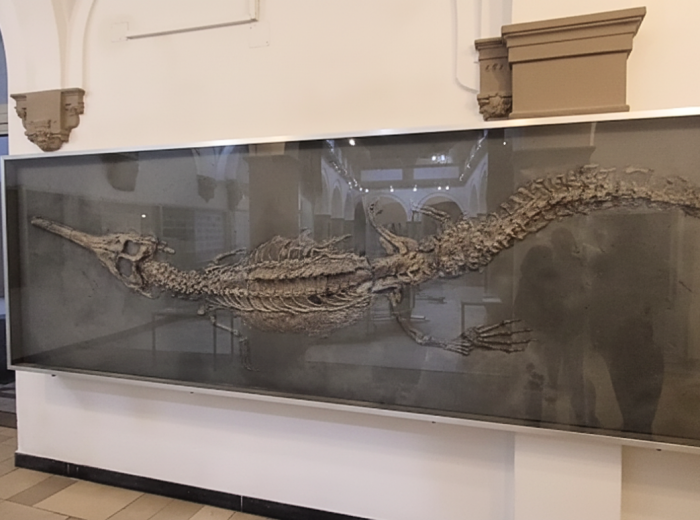
Fossil display at the Palaeontological Museum near Königsplatz
Famous Archaeopteryx fossil, dinosaur skeletons, and tiger remains tell Bavaria's geological story through actual specimens rather than replicas. Zero crowds, free museum admission, and staff who are genuinely excited to share knowledge rather than rush you through to the gift shop. This represents one of Munich's cool museums that rewards genuine curiosity over Instagram documentation.
Viscardigasse: A Quiet Walk Through Munich’s Resistance History
Tiny alley with enormous significance that most people walk past without noticing. Gold cobbles mark where citizens avoided Nazi party salutes by taking alternative routes. Small acts of resistance that required daily courage rather than dramatic gestures.
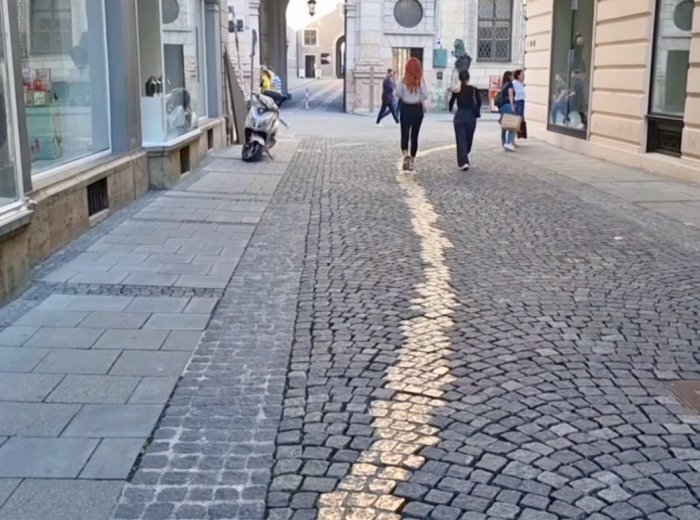
Viscardigasse
Gold cobbles mark the "Golden Path" that resistance took, creating a walking tour meditation on small defiance acts during totalitarian rule that required more bravery than most of us will ever need.
NS-Dokumentationszentrum: Confronting Munich’s Nazi Party Origins
NS-Dokumentationszentrum occupies the actual site where the Nazi party began, creating a documentation center that confronts rather than avoids Munich's complex National Socialism history. Free English tours are often on Sundays, usually around 1 PM, and provide English context that connects historical analysis to current democratic challenges rather than treating history as a safely distant academic subject.
Dachau Memorial Site: Understanding Munich’s First Nazi Concentration Camp
The Dachau concentration camp memorial site represents a sobering day trip that addresses Nazi party history with the seriousness it deserves. Dachau was the first Nazi concentration camp, established in 1933 as the model for what followed.
Practical Tips to Navigate Munich Like You Belong
A few smart moves will save time and money. Use the Bayern Ticket when you go wide and a simple walking tour in the city center. Learn beer garden etiquette so you fit in fast. Watch the seasons and pivot your plan when rain or heat shows up.
The Bayern Ticket: Your Key to Bavaria and Value for Money
The Bayern Ticket covers regional and local transport across Bavaria, regional trains, S-Bahn, U-Bahn, trams, and buses, for €32 for one adult in 2nd class and €72 for up to five adults when bought online or at DB machines (prices subject to change). It works for the S-Bahn to Munich Airport and regional trains toward Füssen for Neuschwanstein. It is not valid on ICE or IC long-distance trains.

S-Bahn pulling into Munich station
Valid 9 AM weekdays (midnight weekends) until 3 AM the following day. Up to five people can travel together on one ticket, making family day trips incredibly affordable compared to individual tickets or private transport.
Munich Public Transport Logic
U-Bahn runs north-south and east-west with German efficiency, S-Bahn connects suburbs to the city center, and trams fill gaps between major routes. Most sights sit in Zone M. Munich Airport sits in Zone 5. Use Zone M or M–5 tickets depending on your route.
German public transport etiquette that locals expect: Stand right on escalators, allow passengers to exit before boarding, and validate tickets before travel. Germans take these rules seriously, and violations result in substantial fines delivered without sympathy or cultural allowances.
Walking Tour Munich: Compact and Actually Pedestrian-Friendly
City center is extremely walkable, and major Munich tourist attractions are within 15 minutes of each other, assuming you can navigate without stopping every block to check your phone. Marienplatz to the English Garden is about 10–15 minutes. Maximilianstraße to Gärtnerplatz is about 10 minutes of pleasant urban walking.

Pedestrian street in Munich’s old town
Cultural Etiquette: Blend In Rather Than Stand Out
Beer gardens operate according to unwritten social rules that ensure everyone enjoys communal spaces without conflict or cultural misunderstanding. White tablecloths indicate restaurant service with higher prices, wooden tables mean self-service, where bringing outside food is not just permitted ut a traditional practice dating back centuries.
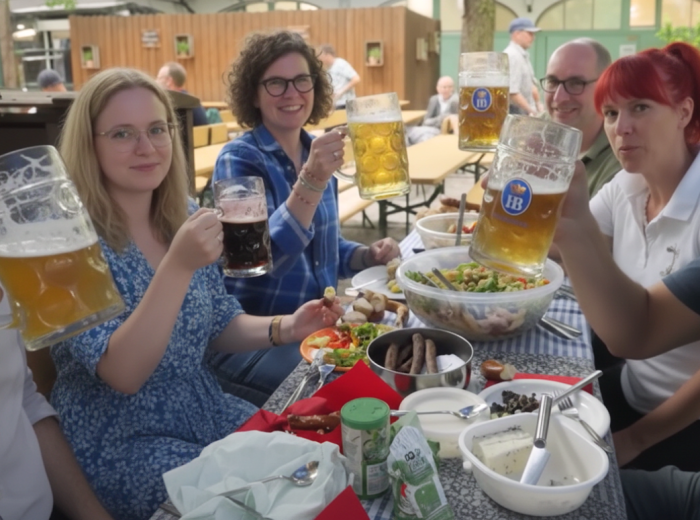
Friends sharing beer at a Munich beer garden
Large tables are communal unless specifically reserved. Yes, you'll share space with strangers, and yes, this is the entire social point. Greet fellow diners with "Servus" when sitting down, engage in conversation if others initiate, but respect those seeking quiet relaxation after long workdays.
Only Munich beer must be purchased from the establishment. Everything else is fair game for outside provision.
Language and Communication: Effort Counts
Everyone in Munich speaks English, but demonstrating German language effort earns goodwill and often results in warmer interactions with service staff and locals: "Servus" (hello/goodbye, informal Bavarian greeting that shows you've done minimal research). "Grüß Gott" (hello, formal Bavarian greeting for more formal situations). "Entschuldigung" (excuse me/sorry, essential for navigating crowds and correcting mistakes)
Germans value directness and efficiency in public interactions, don't interpret straightforward responses as rudeness; it's a cultural preference for clarity over small talk and social performance.
Seasonal Considerations When Munich Shines
Munich shifts personality with the calendar, and you should plan for it. Spring brings beer gardens back to life and gentle light for easy walking tours. Summer means long evenings on the Isar and wide lawns in the English Garden with early starts to beat the crowds. Autumn gives clear days, gold parks, and the surge of Oktoberfest, plus new theater seasons. Winter slows the tempo for Christmas markets, cozy beer halls, and quick train hops to Alpine snow.
Spring: Beer Garden Revival and Hope
Beer gardens reopen as weather permits, outdoor café seating returns to sidewalks, and Munich emerges from winter hibernation with genuine local excitement about outdoor season possibilities. Mild weather is perfect for walking tours, fewer tourists, and authentic local enthusiasm about seasonal change.
Summer: Peak Season Rewards and Tourist Invasion
Long days extending until 9 PM, warm evenings perfect for riverside socializing, full beer garden season operating at maximum capacity, and outdoor concerts that actually matter to local cultural life. Expect crowds at major Munich tourist attractions, and book Munich hotels well in advance if you insist on visiting during everyone else's vacation time.

Cold beer served outdoors on a warm Munich evening
Autumn: Balanced Beauty and the Secret Best Season
Perfect walking tour weather that makes urban exploration pleasant rather than an endurance test, Oktoberfest (September-October) for people who want the authentic festival experience, autumn colors in parks, and harvest season foods that reflect actual agricultural rhythms. Many Munich locals consider this the city's best season, with warm days, cool evenings, and the cultural season beginning with theater and opera programming.
Winter: Christmas Markets and Cozy Culture
Christmas markets from late November through Christmas Eve that serve community social functions rather than just tourist revenue, cozy restaurant and café culture that emphasizes indoor socializing, and winter sports access in nearby Alps for people who enjoy seasonal activities.
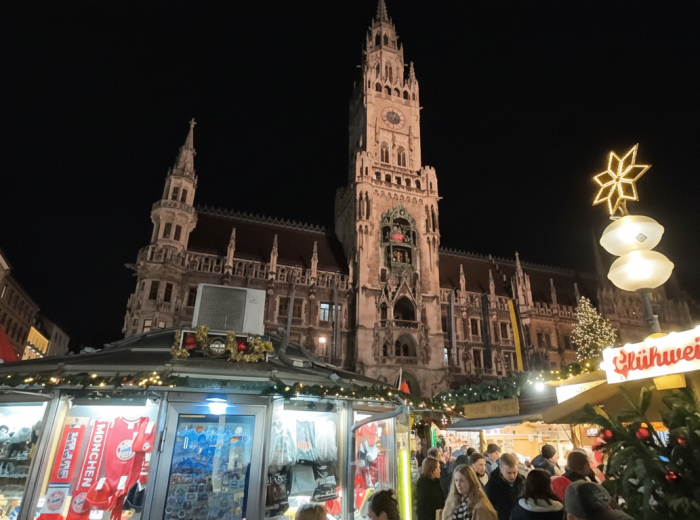
Munich's famous Christmas markets
Booking Strategy That Makes Sense At Munich Hotels
Hotel rates vary dramatically based on events and seasonal demand patterns. Oktoberfest, trade fairs, and major soccer matches drive prices up and availability down. Book well in advance for these periods or avoid them entirely if you value money and sanity.
Central Altstadt hotels offer convenience but guarantee noise and tourist crowds outside your window. Residential districts like Haidhausen provide authentic neighborhood experiences with easy public transport access to major Munich tourist attractions. Staying outside the touristy city center often means better value and more genuine neighborhood experiences where you can observe daily Munich life rather than performing tourism.
More than 26,823 5-star reviews and counting
26,823+ 5-Star Reviews and Counting
Trusted and recommended by travelers worldwide.
Frequently Asked Questions About Things To Do in Munich
1) What are the best things to do in Munich?
Climb St. Peter’s tower, wander the English Garden away from the Chinese Tower, and relax at Augustiner Keller. Don’t miss the Munich Residenz and Viktualienmarkt, then end the day with an evening stroll through Glockenbach and Gärtnerplatz.
2) How many days do I need in Munich?
Three to four days is ideal: Day 1 for Old Town and both Town Halls, Day 2 for museums in Maxvorstadt, Day 3 for parks and beer gardens. Use a fourth day for Dachau Memorial Site, with quiet time built in.
3) Which beer gardens do locals actually use?
Augustiner Keller for tradition, Hirschau for families, Michaeli Garten for lake views in Ostpark, and Menterschwaige and Waldwirtschaft for cyclists and weekenders.
4) Which classic attractions are worth it?
New Town Hall for the facade and Juristische Bibliothek tour. St. Peter’s Church for city views, the Munich Residenz, the former royal palace, Nymphenburg Palace for a summer residence, and the Olympic Park for sunset views.
5) Is Munich walkable for first-timers?
Yes, the city center is compact. Most sights are within 15 minutes on foot. A simple walking tour covers Marienplatz, the Residenz, Viktualienmarkt, and the river.
6) Where should I learn about beer culture without the show?
Head to Augustiner Bräustuben for an authentic beer hall experience. For context, visit the Oktoberfest Museum and stay long enough to enjoy a conversation, not just photos.
7) What should I eat for traditional Bavarian food?
Try Schweinebraten and roasted pork knuckle at places that take pride in their food. Augustiner Bräustuben and Tattenbach serve the classics, while Gabelspiel offers a modern twist that respects tradition.
8) Is the English Garden overrated?
No, it’s one of Europe’s largest urban parks, and it lives up to the hype. Skip the crowded Chinese Tower and head to the Monopteros and Kleinhesseloher See for a quieter experience.
9) What is the smarter alternative to Neuschwanstein?
Schleißheim offers palaces and baroque gardens without the logistics. It’s easily accessible by S-Bahn. If you insist on Neuschwanstein, book early and prepare for a full-day trip.
10) Which museums should I choose if time is tight?
The Deutsches Museum for hands-on science, the BMW Museum with BMW Welt for design and engineering, or Villa Stuck and the Bavarian National Museum for rich cultural experiences.
11) Is there a free museum I should know about?
Yes, the Paleontological Museum is free and engaging. Explore fossils and the Archaeopteryx with knowledgeable staff and students eager to share their insights.
12) How do I use public transport without pain?
Buy the Bayern Ticket for travel across Bavaria after the morning cutoff. Most sights are in Zone M, with Munich Airport in Zone 5. Trams and walking are often quicker than bus tours.
13) Are the Christmas markets worth the time?
Yes, visit weeknights to keep it local. Check out Sendlinger Tor, Schwabing, and Haidhausen for atmosphere and handmade goods. Marienplatz is beautiful but crowded, so go early.
15) What is one overrated spot, and what can it be replaced with?
Hofbräuhaus is loud and commercial. Instead, visit Augustiner Keller outdoors or Augustiner Bräustuben indoors for authentic Munich beer in a more relaxed setting.
16) Which neighborhoods should I prioritize?
Glockenbach and Gärtnerplatz for vibrant evening life, Maxvorstadt for world-class museums and café culture, Haidhausen and Neuhausen for their village feel near parks and palaces.
Why Munich Will Steal Your Heart
After 33 years here, I've learned that Munich's magic exists in the spaces between major Munich tourist attractions, in neighborhood beer gardens where three generations gather for Sunday lunch without posing for photos, in cemetery walking tours where ivy covers centuries of stories, in early Isar River mornings when the city belongs to joggers and dog walkers rather than tour groups with matching t-shirts.
Munich isn't just a collection of things to do in Munich, it's a living city where traditions evolve rather than fossilize, innovation respects history without being enslaved by it, and quality of life gets prioritized over tourist revenue and international marketing.
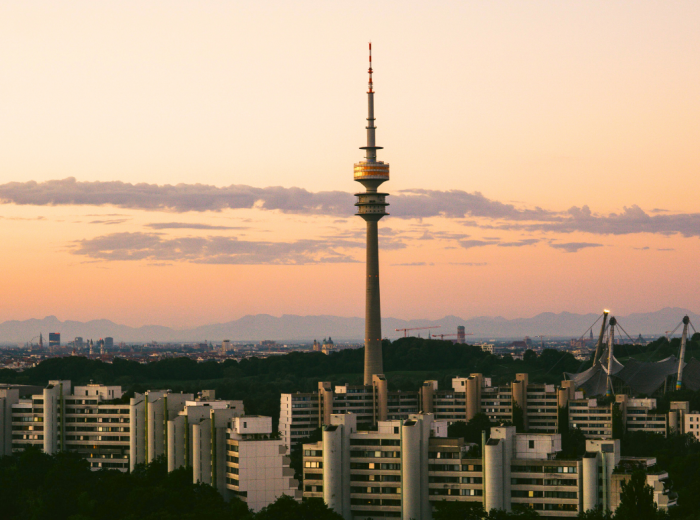
Munich skyline at dusk with Olympiaturm
Authentic local character that welcomes outsiders without performing for them. You'll remember conversations with strangers at communal tables that developed naturally, discoveries in neighborhoods that Munich sightseeing guides overlook, and moments when tourism transformed into genuine cultural exchange rather than consumption.
Our beer culture will surprise you with social sophistication that extends far beyond drinking. It's community building that happens to involve excellent beer. Neighborhood diversity will challenge whatever preconceptions you brought about German urban life. The balance between tradition and innovation will suggest possibilities for how cities can honor their past while creating genuinely livable futures. Use this as a springboard for broader Germany experiences, but start by doing Munich right.
Keep Exploring Germany
Ready to Plan Your Perfect Day in Munich?
Start your experienceWhat If Your Day in Munich Was Planned by Someone Who Knows It — and You?
City Unscripted matches you with a local host who creates a private experience based on your interests, not a set route.
Learn more about usWant to Experience the Real Munich With Someone Who Lives There?
A fully private experience, planned and led by a local host who tailors the day to you
Meet Your Munich Hosts
A personalized way to explore Munich’s must-see landmarks beyond the tourist crowds.
